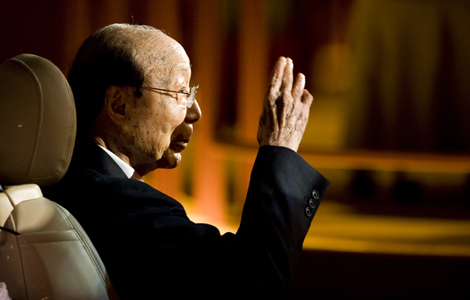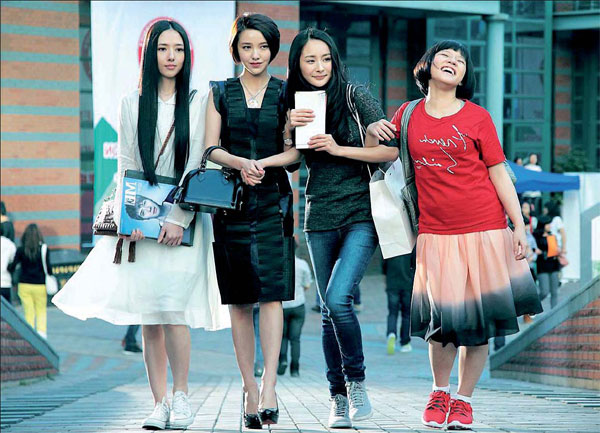Tiny times in shiny Shanghai
Updated: 2014-01-10 10:20
By Terence Hsieh (谢燕辉) (China Daily Europe)
|
|||||||||||
|
Arm-in-arm, four female protagonists in the film Tiny Times face the bourgeois world of Shanghai with class. Provided to China Daily |

Despite its mediocrity, film offers valid portrait of China's wealthy young
Of the inward-looking sociological portraits of China that get unveiled to its mainstream audience, few are taken seriously. The West may often assume that these pictures must provide defining commentary on the hardships of life in a struggling country. Films like To Live or Raise the Red Lantern are held by many in the West as the pinnacle of Chinese cinema-pictures that paint a bleak picture of what it means to live in China. What the scholars from the West are loath to take into account are the push and pull of hidden and unseen forces on the ideologies, desires and tastes of the Chinese people.
Similarly, in looking at a film such as high-school dropout-turned-writer Guo Jingming's Tiny Times, critics in both Chinese and Western film circles find it an easy target for discussing the latest horrific trends in Chinese society, namely the absurd materialism that the four main characters exhibit.
Tiny Times is a film that reflects the pinnacle of a quiet writer-turned filmmaker's male chauvinist dream, and it is true that Tiny Times is lit with the insufferable glow of a 24 carat diamond, portraying Shanghai as a mountain of opulence and glamour. The dialogue of Tiny Times is as artificial and machine-like as an automaton running out of batteries. And yes, Tiny Times is, without a doubt, yet another Chinese take on Western blockbusters - in this case, The Devil Wears Prada.
Our lives kept turning like this, day by day, seconds, minutes, hours-dragging shadows along to become an era.
Wǒmen de shēngmìng jiù zhèyàng yī tiān yī tiān dì zhuǎndòngzhe, miǎozhēn, fēnzhēn, shízhēn, tuōzhe xū yǐng zhuǎndòng chéng zhège pang dà de shídài.
我们的生命就这样一天一天地转动着,秒针,分针,时针, 拖着虚影转动成这个庞大的时代。
We are the most insignificant characters in this era.
ér wǒ, hé wǒmen, dōu shì zhège shídài lǐ zuì zuì miǎoxiǎo wēimáng de cúnzài.
而我,和我们,都是这个时代里 最最渺小微茫的存在。
We live in a vast universe in which stardust and light float everywhere. Our existence is even smaller than them.
Wǒmen huózài hàohàn de yǔzhòu lǐ, màntiān piāosǎzhe yǔzhòu chén'āi hé xīnghé guāng chén, wǒmen shì bǐ zhèxiē hái yào miǎoxiǎo de cúnzài.
我们活在浩瀚的宇宙里, 漫天飘 洒着宇宙尘埃和星河光尘。我们是比这些还要渺小的存在。
We still make tiny efforts in the midst of great despair. This feeling of not being willing to give up, it becomes the specks of starlight in the dark. We're all small specks of starlight.
Wǒmen yīrán zài dàdà de juéwàng lǐ xiǎo xiǎo de juéwàng lǐ xiǎo xiǎo de nǔlìzhe.Zhè zhǒng bùxiǎng fàngqì de xīnqíng, Tāmen biàn chéng wúbiān hēi'àn de xiǎo xiǎo xīngchén. Wǒmen dōu shì xiǎo xiǎo de xīngchén
我们依然在大大的绝望里小小的 努力着。这种不想放弃的心情,它们变成无边黑暗的小小星辰。我们都是小小的星辰。
The movie, while landing rock bottom with critics from both East and West, took a box office high of $11.9 million on its opening day. The highly critical portrayal of Tiny Times belies its strong showing among young adults. The film portrays four young women who start as friends in grade school and transform into socialites with an infinite supply of wealth at their finger tips. Throughout their "growth", their attachment to money, wealth and androgynous men strains and warps their friendship.
The director of the film, Guo Jingming, is also a serial novelist, editor and teen pop idol. After dropping out of high school to continue his writing career, Guo won the New Concept Writing Competition in Shanghai in 2001 and 2002. Guo has published several novels including The City of Fantasies (《幻城 》Huànchéng), the Tiny Times series and currently owns his own publishing company, Ai Ke Entertainment Company, which produces teen magazines aimed at young females. He has sold more than 1 million copies of three of his four novels making him one of the best-selling authors in China.
Tiny Times has also sparked serious debate on feminism in Chinese society. While the film does focus on four female protagonists, more often than not, it seems that they are hopelessly jerked around by cold (and, in some cases, abusive) men who pull the strings more than their helpless female leads. Debate surrounding this particular aspect of the film, has surged on the weibo, China's Twitter.
For all the criticism, Tiny Times is still a reflection of youth culture, and a successful one at that. In both book and cinema form, Tiny Times is a stylized portrayal of the seriousness with which a particular set of Chinese society reacts to its material wealth. As Variety's Maggie Lee so aptly puts it: "(Guo) articulates the cosmopolitan dreams of the masses." Perhaps the intensity of critical response to the film is characteristic of how pervasively materialism has infiltrated Chinese society - a sort of shocked self-evaluation by China's cultural critics. To this degree, Tiny Times is surprisingly candid in the way its characters strive for individual attainment of material wealth: apparently, more than 3,000 individual costumes were required for the film. In some ways, it is the typical blatant defense of corruption, nepotism as a means of achieving in China's dog-eat-dog world. And yet, it comes across almost cynical in the context of the automaton-like delivery of dialogue. In other words, critics are missing the irony of Tiny Times' success - despite its contrived story, schmaltz and swank, terrible acting and unrealistic expectations, it is still a film that speaks to the haute couture dreams of young Chinese females. Terrible cinema can still make a valid point, intentionally or otherwise.
Courtesy of The World of Chinese, www.theworldofchinese.com
The World of Chinese
(China Daily European Weekly 01/10/2014 page27)
Today's Top News
Unexpected sharp fall in tourism hits Beijing
Japan tries to justify Abe's shrine visit
Ground control to Major Tang
Int'l air carriers seeks China share
Apology letter showed goodwill toward China
Iran nuclear deal to take effect
Sharon's death triggers mixed reactions
Former Israeli PM Ariel Sharon dead at 85
Hot Topics
Lunar probe , China growth forecasts, Emission rules get tougher, China seen through 'colored lens', International board,
Editor's Picks

|

|

|

|

|

|






